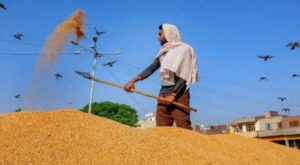
PM-GKAY was initially operational from April to June 2020, but it has since been extended multiple times. It is currently in force until September-end. The scheme, fully funded by the Centre, would have entailed a total expenditure of nearly Rs 3.40 lakh crore if it ceases this month. Expenditure management The government is on course to maintaining its budget deficit at the targeted 6.4 percent of GDP in this financial year, but is yet to decide on extending the free foodgrains scheme beyond September, Finance Secretary T V Somanathan said last week. Maintaining the fiscal deficit will require deft expenditure management.
Meanwhile, food prices have been on an upswing globally since Russia’s invasion of Ukraine in February. Changing weather patterns have hurt sowing of summer-sown crops and food stocks have dipped. India has curbed outbound shipments of wheat and wheat flour. It has also prohibited exports of broken rice and imposed a levy on shipments of unmilled and husked brown varieties.
India’s rice stocks in the central pool as of August 1 stood at 279.52 lakh tonnes and those of wheat at 266.45 lakh tonnes, according to the Food Corporation of India (FCI). According to the buffer norms, FCI should have 102.5 lakh tonnes of rice and 205.2 lakh tonnes of wheat, including 20 lakh tonnes of rice and 30 lakh tonnes of wheat in strategic reserves as on October 1. The aggregate allocation of free foodgrains under the PM-GKAY will stand at an estimated 1,003 lakh tonnes at the end of September. Rural vs.
urban economy To ensure foodgrain stock management, the government substituted a quantity of about 11.06 lakh tonnes of wheat per month under the scheme into rice for five months from May to September. Meanwhile, the economy has been on an upswing, as indicated by a recent spate of data. Inflation, which is still above the central bank’s medium-term target, has also come off eight-year highs. To be sure, the decision on extension of the scheme will also depend on the government’s assessment of the rural economy, which is trailing the urban economy. The scheme may be tapered off beyond September and not discontinued, CRISIL’s Chief Economist Dharmakirti Joshi had told Moneycontrol last month.




 Driving Naari Programme launched in Chandigarh
Driving Naari Programme launched in Chandigarh






























